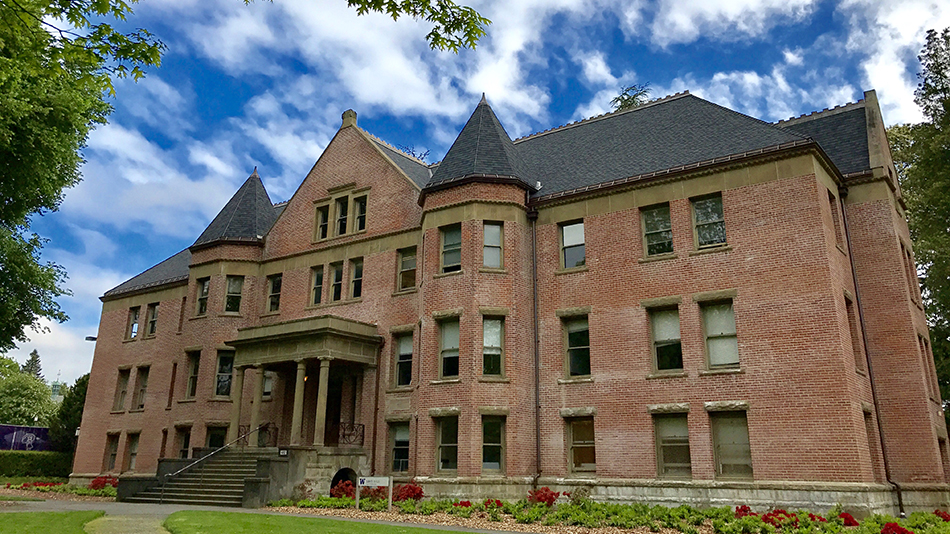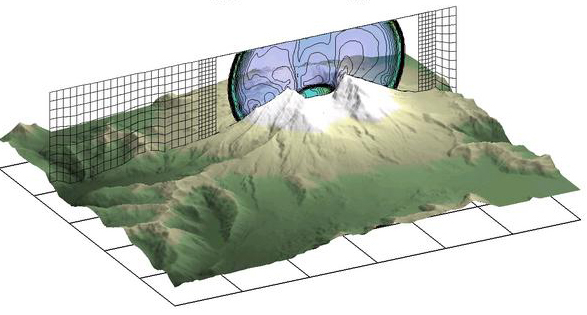
Applied Mathematics is the discipline of discovering, applying, and promoting the use of mathematics to model and solve practical problems in many disciplines, ranging from physical sciences and biology to medicine and industry.
VISIT DEPARTMENT WEBSITERESEARCH
By nature, applied mathematics research is interdisciplinary. By exploiting the common underlying mathematical framework, we initiate the cross-fertilization of ideas and techniques from one discipline to another. Many of our faculty members are either joint or adjunct faculty in another department. The faculty is widely known for its research leadership and authorship of many research papers, textbooks, and monographs, and activity on editorial boards of leading journals.
Primary Areas of Research Include
- Scientific Computing
- Numerical Analysis
- Machine Learning
- Mathematical Neuroscience
- Mathematical Biology
- Partial Differential Equations
- Data Science
- Fluid Mechanics
- Asymptotic Analysis
- Dynamical Systems
- Financial Mathematics
- Mathematical Methods
- Nonlinear Waves and Coherent Structures
- Probability
- Applied Linear Algebra
- Atmospheric Sciences
- Climate Modeling
- Computational Methods
- Geophysics
- Inverse Problems
- Mathematical Ecology
- Mathematical Epidemiology
- Perturbation Methods
- Statistics
- Stochastic Modeling
283
Undergraduate Majors
EDUCATION
Undergraduate Programs
Students in the UW Department of Applied Mathematics find a culture of excellence and respect within a warm, collegial atmosphere. The Department provides opportunities to its undergraduate students in solving real world problems through class projects and research opportunities. Our students learn to model phenomena mathematically and to develop combined analytical and computational approaches for problem solving. They learn to communicate using the language of mathematics and the language of various applied disciplines, and to work with others to advance the frontiers of knowledge. Our students graduate with the knowledge, the experience, and the ability to be leaders in a society that exhibits increasing demands for competence in communication, computation, and quantitative analysis.
The Bachelor's of Science in Applied Mathematics (AMATH) incorporates interdisciplinary study in the physical, engineering, and biological sciences. The Department provides dynamic and engaging training that is especially strong in mathematical methods (scientific computing, data science, etc.) and in application areas (mathematical biology, health sciences, nonlinear waves and coherent structures, mathematical finance, data analysis and climate modeling).
The Bachelor's of Science in Computational Finance & Risk Management (CFRM) provides students with a rigorous mathematical, statistical, and computing foundation, enabling future success in the rapidly changing financial services industry. The program jumpstarts students' skills and knowledge for a career in a variety of fields, or further academic study in financial engineering, and helps them to be leaders in a society that exhibits increasing demands for competence in communication, computation, and quantitative analysis.
The Data Science Options in Applied Mathematics (AMATH-DS) and Computational Finance (CFRM-DS) provide students with training in data science methods and practices, and incorporate statistical modeling, machine learning, artificial intelligence, and optimization. In addition to students in our majors, the Department also provides undergraduate courses for the Applied and Computational Mathematical Sciences (ACMS) Bachelor’s Degree program and teaches service courses in applied mathematics for students from many other departments.
Graduate Programs
Our graduate programs offer advanced interdisciplinary study, research, and training in contemporary mathematical methods applicable to the physical, engineering, and biological sciences. The Master of Science in Applied & Computational Mathematics and Master of Science in Applied Mathematics programs can be completed full-time in one year, providing a strong foundation for professional advancement or further doctoral research.
The Master of Science in Computational Finance & Risk Management is a rigorous and flexible program in the field of quantitative finance and financial engineering that prepares students for advanced study and a wide variety of careers in the financial services industry. Domestic and international students can attend full-time or part-time, on campus or online, completing a curriculum that includes extensive instruction in the R-programming environment, classical volatility and mean-variance methods of risk analysis and portfolio optimization, modern fat tails and tail risk methods of risk management, and portfolio optimization.
The PhD in Applied Mathematics is a research-focused degree that integrates computational and analytical methods to investigate complex problems in diverse areas such as neuroscience, medical imaging, evolutionary biology, mathematical ecology, oceanography, physics, mathematical finance, and economics.
Degree Options
We offer a broad curriculum of graduate and undergraduate courses in applied mathematics to provide students with the tools they need to succeed, and we offer different degree options tailored to our students’ academic goals.

Applied Mathematics:
- BS
- BS with Option in Data Science
- ACM MS On Campus
- ACM MS Online
- PhD
Computational Finance & Risk Management:
- BS
- BS with Option in Data Science
- MS On Campus
- MS Online
Students
Autumn 2025
- 283 Bachelor of Science students
- 201 Master of Science students
- 56 PhD students
Degrees Awarded
2024-2025
- 60 BS degrees - Applied Mathematics
- 21 BS degrees - Computational Finance and Risk Management
- 81 MS degrees - Applied Mathematics
- 56 MS degrees - Computational Finance and Risk Management
- 5 PhD degrees
FACULTY
Autumn 2025
- 13 Core Faculty
- 9 Acting Instructors or Postdoctoral Scholars
- 10 Emeritus Professors
- 12 Adjunct Faculty
Faculty Awards
(includes awards to emeritus faculty)

- 4 Members of the National Academy of Sciences
- 1 Fellow of Royal Society of London
- 2 Presidential Young Investigator Awards
- 6 National Science Foundation CAREER Awards
- 7 Fellows of the Society for Industrial and Applied Mathematics
- 1 Fellow of the American Physical Society
- 1 Fellow of the American Geophysical Union
- 2 Fellows of the American Mathematical Society
- 2 Fellows of the American Meteorological Society
- 2 Guggenheim Fellows
- 1 Sloan Foundation Fellow
- 1 Burroughs Wellcome Career Award
- 1 CoMotion Presidential Innovation Fellow
- 1 President of the European Society of Mathematical and Biological Society
- 1 SIAM Activity Group on Financial Mathematics and Engineering Early Career Prize
- 1 Johnson & Johnson WiSTEM2D Scholar
- 1 CSDMS Lifetime Achievement Award
- 1 Akira Okubo Prize
- 1 Sonia Kovalesky Lecturer
- 1 Bernard Haurwitz Memorial Lecture
CONTACT
Department of Applied Mathematics
Box 353925
University of Washington
Seattle, WA 98195
(206) 543-5493
amath.washington.edu
last update: November 2025